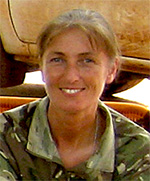Lt Col Alison Farmer was one of 75+ people attending a symposium in Brussels organised by the European Defence Agency (EDA) and EU Military Staff (EUMS) to discuss medical support for EU operations.
Lt Col Farmer is the medical planner for the EU Military Training Mission in Mali (EUTM Mali). She has been a nurse within the British Army for almost 30 years, being deployed to Afghanistan, the Balkans, and a range of other countries.
Alison, what does EUTM Mali do and what is your role within it?
 | Lt Col Farmer is the medical planner for the EU Military Training Mission in Mali (EUTM Mali). |
The aim of EUTM Mali is to contribute to the training and advice of the Malian Armed Forces (MaAF). The Mission began in February 2013, following the request of the Malian authorities (and UNSCR 2071), to help Malian troops overcome the insurgency in northern Mali. More than 23 EU Member States have contributed military personnel to the mission to date.
As the Joint Medical Planner for the Mission, I am responsible for all aspects of medical support and advice in the Mission Area. Within my team of 3, we conduct planning to ensure all our medical assets (medical treatment facilities including Ground and Air MEDEVAC), can deliver continuous 24 hour care for EUTM MALI personnel. We also undertake health surveillance of our Population at Risk and health threats from the local environment.
What challenges do you face in Mali? What do you need to take into account when formulating medical plans?
The main one is that of logistics; the training of the MaAF takes place at different locations in southern Mali – so we implement a medical plan to mitigate against any possible incident at the sites. Our plan has to be robust to make sure we can medically evacuate a seriously injured casualty from the point of incident to our Role 2 within the 10-1-2 medical planning guidelines. This can be challenging considering the distances that we need to cover, and the infrastructure within Mali. We test all our plans through recces and by monthly medical exercises before the plans are agreed by the Mission Commander.
How does your team work? Do you work in separate national teams within the mission?
No, my team is multinational, and medical planning is conducted for the whole of the mission, not for a single nation; so for all French, German, Belgian, Spanish etc.; whichever Member State personnel are part of EUTM MALI.
What are the advantages and challenges of this multinational environment?
It’s a great opportunity to share our knowledge and experience with each other. I see it as overwhelmingly positive; we all have different backgrounds and skills. We may have different approaches to the challenges we face, but our common goal in making the mission a success, gels our methods. Much of that is about information sharing and finding the best way to manage situations.
Lastly why are you here at the EU medical symposium? And have you found it a useful experience?
The EUMS medical advisor told me about the symposium. The event and the programme drew my attention, as the topics were broad and varied. It’s also a great way of meeting those at strategic level and fellow planners from other missions to have a broader understanding of what else is going on.
I’ve really enjoyed the two days and have learnt a lot. I have spoken to lots of people during the symposium which has opened up new information exchange areas. I’m looking forward to bring the information back and sharing it with my colleagues in EUTM MALI.